Matt Rees's Blog - Posts Tagged "project"
Review: Crime fiction's first PI Pig
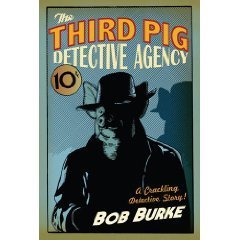
The Third Pig Detective Agency by Bob Burke
published by The Friday Project isbn 1906321752
Seeing his brothers' houses blown down by the Big Bad Wolf ("I'll huff and I'll puff...") taught Harry Pigg to build his own house out of bricks, thus avoiding the grisly fate of the first and second pigs. The nursery rhyme carries a lesson for all little children... It also forms the somewhat traumatic background that turns Harry into the wise-cracking detective of Bob Burke's engagingly witty new novel.
We're in Grimmtown, where everyone is a character from a fairy tale or a nursery rhyme. But it's no fairytale wonderland. In fact, it's rather true to the stories of the Brothers Grimm, whose nightmarish old tales always seem to me distinctly inappropriate for small children (the chipper little Gingerbread Man, for example, gets eaten and that's the end of that. Whoever thought these would be good stories for kids?) On the mean streets of Grimmtown, hard-up Harry Pigg is hired by Aladdin to track down his stolen magic lantern, though this displeases Aladdin's thuggish bodyguard, one of the Billygoats Gruff. Dwarfs, leprechauns and genies ensue.
This is undoubtedly the most whimsical hardboiled detective novel ever written, and it's utterly delightful.
“What happened to the third little pig, Daddy?”: Bob Burke on pig detectives and his Writing Life
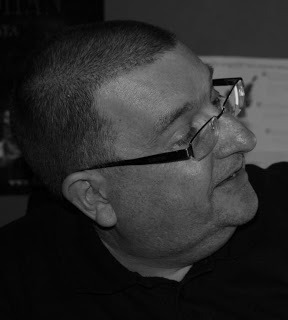
Anyone who’s perused the crime fiction section of their bookstore knows the joy of finding something original among the tired old shelves of loner detectives who play by their own rules on the mean streets of some dingy inner city. The clichés of the genre were uppermost in my mind when I chose to write about Omar Yussef, a schoolteacher and detective in a Palestinian refugee camp on the edge of Bethlehem. Irish writer Bob Burke has not merely blown the crime formula away like Dirty Harry's Magnum – he’s used them as the source of much of the fun in his great new novel “The Third Pig Detective Agency.” Bob’s first book in the series is populated by characters from nursery rhymes and fairy tales. His detective is the surviving Little Pig (after the Big Bad Wolf ate the first two) and his mean streets are in Grimmtown (as in The Brothers Grimm of fairy tale fame). In my review, I wrote that “Third Pig” is “undoubtedly the most whimsical hardboiled detective novel ever written, and it's utterly delightful.” As you’ll see from this interview, so is Bob Burke.
How long did it take you to get published?
Since I started taking writing a bit seriously, about three years – but I was lucky.
Would you recommend any books on writing?
In terms of what I got out of them, I’d suggest two: Stephen King’s On Writing for its very straightforward, no nonsense approach to putting pen on paper (as well as being a very honest autobiography) and Carole Blake’s From Pitch to Publication which shows how the industry works from first draft, through getting an agent, contracts, publication etc. Both are invaluable for anyone starting out.
What’s a typical writing day?
During school term I get my sons to school and am back at the house by 9:30 (probably still asleep). I’m definitely not a morning person so after a refueling session with coffee, I start by checking email, blogs, twitter and doing any publicity bits and pieces that may have arisen (aka arseing around on the web). Once I’ve evolved from zombie to something approaching human I start on whatever story I happen to be working on and work through until about 5pm, with numerous refueling stops along the way (coffee, must have more coffee). I never worry about word counts as long as I have something on paper (or on PC to be more accurate). Eventually something tangible appears from the combination of brain, caffeine and willpower.
Plug your latest book. What’s it about? Why’s it so great?
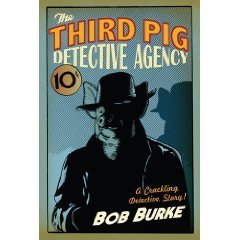
Harry Pigg – sole survivor of the unfortunate Three Little Pigs incident and self-styled master detective – is hired by Aladdin to locate his missing lamp. The trail leads Harry through a maze of unreliable informants, mysterious strangers, not-so-dastardly villains, occasional beatings and an unpleasant encounter in a sewer. Is it great? Most people that have read it seem to like it, which is all I can ask for. It’s certainly a different take on the traditional detective novel.
How much of what you do is:
a) formula dictated by the genre within which you write?
b) formula you developed yourself and stuck with?
c) as close to complete originality as it’s possible to get each time?
The formula for the detective story (particularly the hard-boiled type) is so well established that it provided the perfect template to work with – and take the piss out of. I just wanted to approach it from a slightly skewed angle but still work with all the conventions that people are familiar with (and probably expect). I’d like to think that my take on it has some degree of originality that will make readers want to come back to it again (and again and again and…)
What’s your favorite sentence in all literature, and why?
Squire Trelawney, Dr. Livesey, and the rest of these gentlemen having asked me to write down the whole particulars about Treasure Island, from the beginning to the end, keeping nothing back but the bearings of the island, and that only because there is still treasure not yet lifted, I take up my pen in the year of grace 17__ and go back to the time when my father kept the Admiral Benbow inn and the brown old seaman with the sabre cut first took up his lodging under our roof.
It’s not great literature but that one line, the opening to “Treasure Island,” opened up the world of story to me. With that book I went from reading stories that were short and illustrated to a more intimidating volume that was rich with text and had no pictures. Almost immediately I was sucked into the story, all sense of intimidation gone as the narrative carried me into a true adventure story. Even now, Treasure Island remains one of my favourite reads.
The line that made me laugh the most (and still does) is from The Colour of Magic by Terry Pratchett: Rincewind had been generally reckoned by his tutors to be a natural wizard in the same way that fish are natural mountaineers.
What’s the best descriptive image in all literature?
If I might be permitted to go all literary and pretentious, the passage that sends shivers down my spine is the last page or so of Finnegans Wake by James Joyce where he describes the River Liffey flowing into the sea. Yes, most of the rest of the book is impenetrable and I don’t claim to have made any sense of it but that one piece is accessible, evocative and so beautifully written
Who’s the greatest stylist currently writing?
John Connolly. His ability to mix wonderful prose, engaging characters and compelling storylines make me want to weep every time I read one of his books. He’s also managed the difficult task of injecting his otherwise dark stories with a vein of black humor that never seems forced or inappropriate.
Who’s the greatest plotter currently writing?
Jeffrey Deaver. Take an impossible situation, throw in a series of plot twists and end with a satisfying and logical conclusion and you have a recipe for one of his books.
How much research is involved in each of your books?
A quick shufti through the Bookmarks section of my web browser shows one link: an online version of Grimm’s Fairy Tales. Make of that what you will! In fairness, there’s such a rich treasury of nursery rhymes and fairy tales that I can “gleefully molest” (as one reviewer put it) that research isn’t as necessary as it might be for anything else I may write.
Where’d you get the idea for your main character?
I’d finished telling The Three Pigs to one of my sons and he asked, with typical child curiosity, “what happened to the third pig after the story was over?” I didn’t even have to think about it, the image of that third pig becoming a detective sprang almost fully-formed into my head. All I had to do then was work with it and develop a story.
Do you have a pain from childhood that compels you to write? If not, what does?
I think that discovering the power of storytelling through early exposure to Treasure Island and subsequently with Edgar Rice Burroughs and Tolkien fuelled my imagination and gave me the urge to tell stories. Unfortunately there’s no hint of any trauma in the orphanage, wicked stepmothers or being sent out to steal by a shifty guardian in my childhood.
What’s the best idea for marketing a book you can do yourself?
Flog the web to death. Blog about it, twitter about it, link to blogs with similar themes. Also, local papers are always interested in the “local lad does good” angle and will more than likely welcome an approach, which may lead to other media taking an interest.
What’s your experience with being translated?
I’ll let you know if it ever happens!
Do you live entirely off your writing?
Not yet. I do some part time IT training in tandem with my writing but hopefully one day…
How many books did you write before you were published?
One. Again, I know how lucky I’ve been.
What’s the strangest thing that happened to you on a book tour?
A book tour, now there’s an aspirational goal.
What’s your weirdest idea for a book you’ll never get to publish?
Well, if having a pig detective trying to find Aladdin’s lamp isn’t weird enough, I don’t know what is. Seriously, I think that any idea, regardless of how outlandish, may have the germ of a story in it somewhere. It may just need some nurturing and the occasional reality check before it ever becomes part of a coherent narrative.
I Have Publishing Surrounded: John Higgs's Writing Life
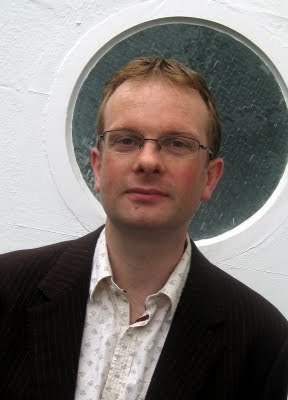
Thomas Carlyle wrote that “A well-written life is almost as rare as a well-spent one.” There may be some debate as to whether Timothy Leary’s life was well-spent. However, his biography by John Higgs is one of the most well-written and compelling books you’ll ever come across. “I Have America Surrounded: The Life of Timothy Leary” is an alternative history of the turbulent times that made modern America. Though it’s nonfiction, it reads much like James Ellroy’s hardboiled fictionalizations of the duplicitous reality behind the 1960s and 1970s in the U.S. Once you read the book and read this interview with John Higgs, you’ll understand why he was so attracted to Leary, the scientist who saw LSD as the answer to many of society’s ills and who ended up being called the most dangerous man in America by the FBI. No, not for the drugs (though one can’t rule that out….) Rather because John, an experienced tv writer and producer, is a man who doesn’t accept the idea that things simply have to be the way they seem to others.
Do you live entirely off your writing? How many books did you write before you could make a living at it?
I don't see living entirely off writing as a realistic aspiration in the Twenty-First Century, if I'm honest. It is still possible, of course, but the publishing model is in such a state of flux that only a wild and reckless gambler would wed their future financial security to it. The most significant factor, in my view, is that the amount of writing available to the reader has increased exponentially, and a sizable percentage of that is free. That alone changes everything, and threatens the writer with smaller, more fragmented audiences at best, or obscurity at worst. However, the cultural gatekeepers are also becoming increasingly irrelevant and you no longer need permission to go out and find readers. I'm delighted by all this. I love eBook readers, Print on Demand, profit-share deals with publishers and all the rest. I can't imagine a more exciting time to be a writer.
It's not the best time to be in the publishing industry, of course, as it undergoes a slow-motion nervous breakdown. The industry operates at such a 19th Century pace that if you killed it, it wouldn’t notice for eighteen months and then it would take another year to actually get round to dying. But even so, everyone can see that major, unstoppable structural change is happening. I have a hunch that in a few years time the writer-agent-publisher relationship will be start to be replaced by a writer-manager model, with publishing, promotion and distribution farmed out on a project-by-project basis while the manager concentrates on building a long-term readership for the author.
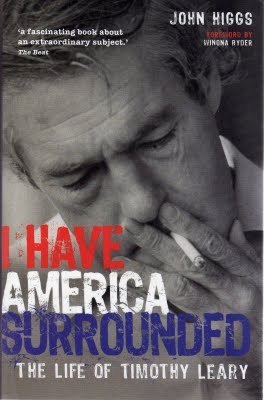
I'm not sure that everybody is prepared to be realistic about the changes that are happening. The idea of ‘writing books’ as a profession rather than a vocation, interest or even hobby is a very romantic one and people cling to it. Writers get very angry at the idea that no-one wants them to write enough to actually give them money to do it. Painters and, to some extent, musicians and actors are generally more realistic about this than writers, and also more realistic about why they do what they do. There's no reason why writers should be above working for a living - the likes of Philip Larkin or T.S. Elliot were prepared to do so. I think a big part of this is because the idea of using writing as an excuse to lock yourself away and withdraw from the world can be very seductive.
Of course, I like money. I like people giving me money, and I especially like getting money for something that I have written. But I think the writer/reader relationship is much healthier now, now that the playing field has been leveled, and if that means authors need to hold down a day job then that's a fair price to pay.
What's a typical working day?
There's no such thing as a typical working day, just as there's no such thing as a typical person or a typical philosophy. My writing life consists mainly of trying to find little two-hour windows where I can sneak off and furiously type away, without anyone giving me a hard time for doing so. You can get a surprising amount done using this method.
Do you have a pain from childhood that compels you to write? If not, what does?
I don’t know what compels me to write, but I don’t think it’s pain from childhood. My current best guess is that I write about things in order to lose interest in them. It is those things that don’t make any sense that I have a problem with. My brain is unable to digest them and they stick around, endlessly being picked over and prodded. Writing about them is the only way I know of flushing these buggers away, leaving me clear headed and hopefully a little saner.
Other writers have other reasons for writing but I don’t claim to understand what they are. Consider writer’s block, for example; being unable to write because you have nothing that you need to say. This sounds terrific to me. Imagine all the things you could do with the time! Yet other writers insist writer's block is a terrible thing, so presumably I’m failing to understand something somewhere.
How many books did you write before you were published?
My first book was published, but then I'm a lucky beggar. That said, of course, most of the stuff I write is scrappy nonsense which is written entirely for myself and shoved away in a draw and forgotten about. Only occasionally does it amount to anything that would interest others enough to justify the process of editing, polishing and all the business stuff involved in getting it published. I'm pretty lazy and would be quite happy not to have to go through all that, but it is important to be read and to have the contents of your head peer reviewed from time to time.
Who is the greatest plotter currently writing?
I'd say Steven Moffat. TV writers tend to be better plotters than novelists or film writers – at least, the really good ones are. Novelists have too much freedom and screenwriters are too restricted by the amount of people involved and the compromises that are needed when so much money is at stake. TV writers are in a middle ground where they have to hold a general audience but can't rely on big budget spectacles, so they have to get good at either plot or character, and preferably both.
Who is the greatest stlyist currently writing?
I recently read an unpublishable novella called 'The Nabob of Bombasta' by Brian Barritt, the English beatnik who you might remember from my Timothy Leary biography. I can only describe it as like literary wasabi. It is so wild and extreme that taking a little between regular literature wipes clean your mental pallette and allows you to approach your next piece with a fresh, unprejudiced mind. It is way beyond obscene and unacceptable, but it is so good-hearted, absurd and funny that anyone who claims to be offended by it is probably lying, and probably lying to themselves. Brian quite happily describes it as utterly unpublishable yet I hear it will be published next year, on Valentine's Day. Look out for that one!
What's the weirdest idea for a book you'll never get to publish?
You can publish anything these days, no matter how weird. The only constraint is whether there is an audience big enough, or interested enough, to justify your time. But as for weirdest idea, I sometimes hanker to re-publish the Bible in wildly unsuitable fonts, to see if it retains any credibility. Who wouldn't want a copy of 'The Old Testament in Comic Sans'?
What's the best descriptive image in all of literature?
That's an easy one. The best descriptive image in all of literature - better than "He Wishes for the Cloths of Heaven" or "Rough winds do shake the darling buds of May" - is Douglas Adams' "The ships hung in the sky in much the same way that bricks don't."
Plug your latest book. What's it about? Why's it so great?
Christ no - where's the fun in that?
Review: The year's best Police procedural
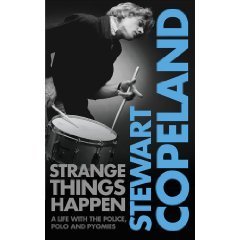
Strange Things Happen: A Life with The Police, Polo and Pygmies
By Stewart Copeland
Publisher UK: The Friday Project US: HarperStudio
Just because I write crime fiction doesn’t make me obsessed by The Police. However, this new memoir by The Police drummer is absolutely the most delightful surprise of the year. Copeland writes with the same verve and invention he displays in his deceptively tricky drumming. Turns out he’s the son of the CIA Beirut station chief and grew up frolicking in the Mediterranean waves with the son of Kim Philby, the British spy who was a double agent for Moscow. The book is excellent on Copeland’s early days with the band Curved Air (he used to write letters to music newspapers assuming the identity of fans: “I just saw Curved Air. They’re great, and who’s that amazing drummer…”) The early days of The Police are handled inventively, and he writes about his second career scoring film soundtracks with great intelligence. The greatest pleasure is to see The Police’s reunion tour from the inside. There’s a lot of creativity and bemusement as Copeland finds himself once again playing with Sting and Andy Summers, being feted everywhere. He’s also great on the resurrection of the nettlesome relationship with the band’s most famous member. (At one gig in Turin, Sting keeps turning toward him and angrily mouthing that he ought to play differently. Copeland, who’s in his 50s and has been banging the tubs since he was 12, begs to differ. Mid-concert he finds himself screaming into his drums: “You fucking—Fucking—Fuckkkkinnnng bastard!”) Could’ve titled this one: “Sometimes Even Millionaires Wonder Why the Hell They’re Doing What They Do.”



